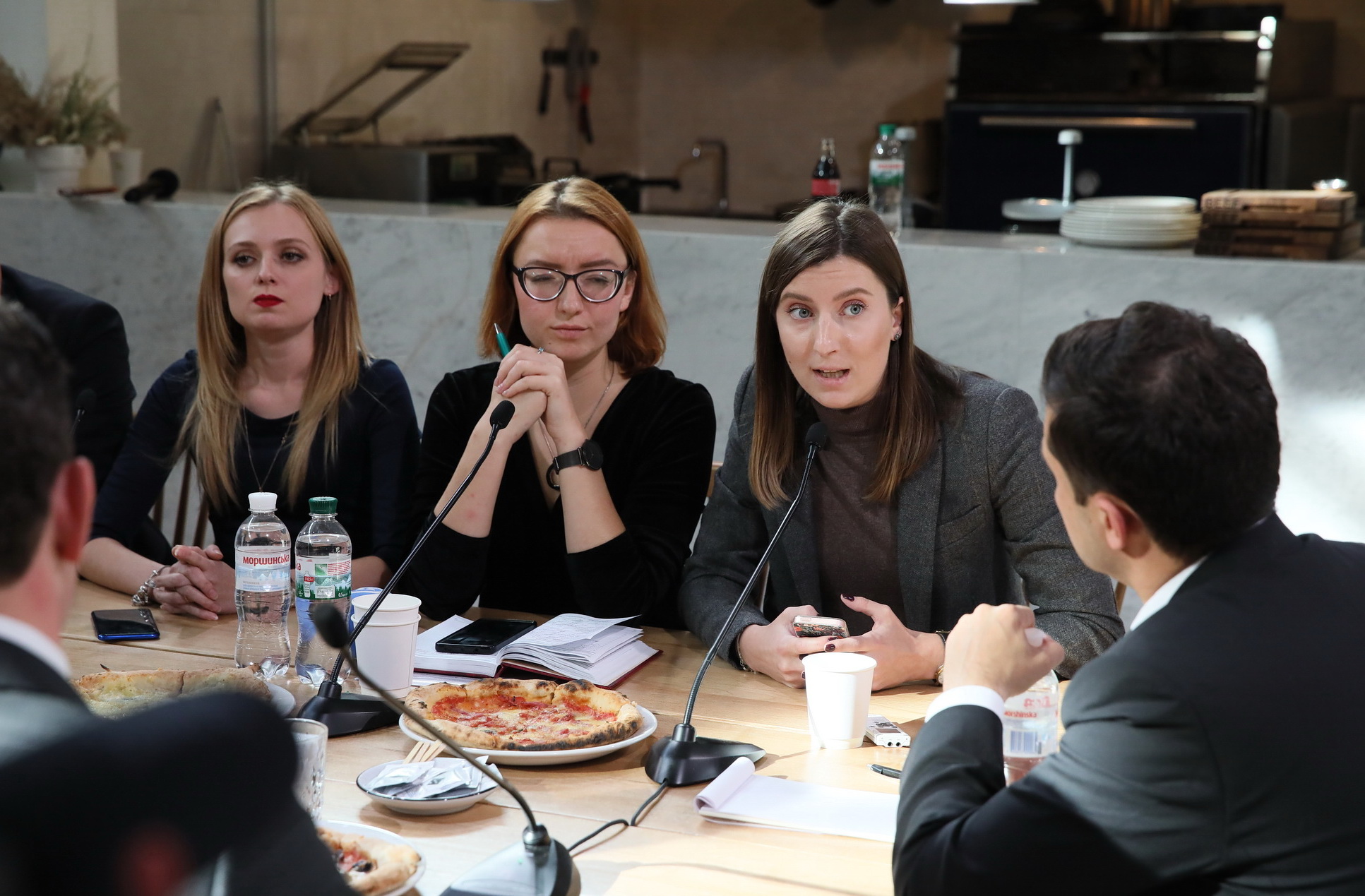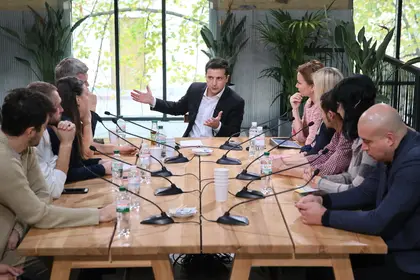President Volodymyr Zelensky’s first press conference as president was a memorable one: it took place at a new food hall in central Kyiv and lasted for more than 12 hours.
On Oct. 10, Zelensky spoke with some 300 Ukrainian and foreign journalists, including a Kyiv Post reporter, during the press marathon that is now thought to be the longest press conference ever held by any sitting president.
JOIN US ON TELEGRAM
Follow our coverage of the war on the @Kyivpost_official.
The most frequently asked questions concerned Zelensky’s now infamous July 25 phone conversation with his U.S. counterpart Donald J. Trump, his approach to the peace process against the Russian aggressor in the Donbas and criminal cases he is awaiting to be investigated. He threatened some former officials with jail, claimed his predecessor Petro Poroshenko would “answer for all he did,” and defended members of his own team.
Zelensky, however, was short-spoken about his relations with billionaire Ihor Kolomoisky and other oligarchs, the ongoing investigation into the 2016 murder of journalist Pavlo Sheremet and attempts by his team to pressure individual entrepreneurs by imposing more rigid controls on them.
Sometimes he was cheerful, sometimes openly rude. He spoke in Ukrainian, in English and sometimes in Russian. He ate at the table and offered meals to journalists. Sometimes he spoke to people who shouted questions at him from the lower level of the food hall.
Here are some highlights of what he said:
Trump pressure
Zelensky once again repeated that Trump didn’t pressure him during the July 25 phone conversation, which triggered the whistleblower scandal and led the U.S. House of Representatives to open an impeachment inquiry into Trump. Trump openly asked Zelensky to investigate former U.S. Vice President Joe Biden, his most likely competitor in the 2020 U.S. presidential election.
Under pressure from an American journalist to answer as to whether it was corrupt of Trump to ask that, Zelensky answered: “I think it wasn’t corruption… I would like the U.S. legislation to comment on what Trump said, not me as the president. If I, as the Ukrainian president, comment on the words of Mr. Trump it would be interference in your legislation and interference in your future elections. So it would be interference into your electoral process that would become not clean and not independent because of me. I don’t want to interfere in the American elections and I don’t want you (Americans) to interfere into ours.”
Donbas peace plan
Zelensky many times had to answer to Ukrainian journalists about Russia’s war. He said he’s urging a meeting with Russian leader Vladimir Putin mediated by German Chancellor Angela Merkel and French President Emmanuel Macron. He said the recent deaths of Ukrainian soldiers are driving his desire for urgent talks.
“To be honest, the statistics data is the following: every two days we have one person (killed)… I have a table with their last names,” he said.
But Zelensky assured that if Ukraine would not be able to hold free elections in the Russian-occupied part of Donbas and control the border with Russia, he would abandon this plan and seek a different solution.
“If we would not be able to control the election there or the border, I’ll go back to you and we will not follow this plan in the nearest future and will look for other options,” he said.

EuroMaidan murders
Zelensky said he had met with Sergii Gorbatuk, the top investigator in charge of cases into the 2013-2014 EuroMaidan Revolution, including the murder of more than 100 protesters in the dying days of Kremlin-backed President Viktor Yanukovych’s rule, and demanded to see results.
“I wondered whether there would be final results at any time in those cases… He said ‘it will take years.’ And I told him: ‘What does the president have to do to make it faster than years? Five years have already passed. What is needed? More prosecutors, more independence or who else should you be protected from’?”
Zelensky said that he had set a goal for law enforcers to “show results” in several high-profile criminal cases by Nov. 1, 2019 or by Jan. 1, 2020 at the latest.
Avakov on probation
Zelensky also commented on the re-appointment of Arsen Avakov as interior minister in August. As many as 24 civil society groups and anti-corruption watchdogs urged Zelensky and lawmakers not to re-appoint the minister, whose son and allies are implicated in several corruption investigations.
“This is not a compromise, I don’t owe him anything,” Zelensky said of Avakov. “This is, to be honest, a probation period, we want to see the new faces in the Interior Ministry.”
He added that if there are no results by the end of this year, some people would be fired. He didn’t specify if he meant firing Avakov specifically.
Ihor Kolomoisky
Zelensky sent mixed signals about Kolomoisky and the oligarch’s struggle to somehow regain control of his former bank, PrivatBank, which was nationalized in 2016, and from which Kolomoisky allegedly stole $5.5 billion through insider lending.
At first, Zelensky said it makes sense to negotiate with Kolomoisky about the future of PrivatBank. He said this way the government could solve this issue outside of the court, where Kolomoisky is suing Ukraine and where the government’s position is weak.
“I think it makes sense to talk to him about this,” he said. “If we have a weak position in some situations we need to talk. We need to sit and talk with him that it will not be like this, nobody will give you money back but you want to keep on living in this country… I’m ready to talk with any oligarch.”
Then, however, Zelensky said something different about PrivatBank. “We must do everything we can so that the previous owners don’t get a single kopeck,” he said.
Serhiy Pashynsky
Zelensky also commented on the Oct. 7 arrest of Serhiy Pashynsky, a former lawmaker from the People’s Front party, in a case where Pashynsky shot a man in 2016, wounding him. Pashynsky argued that he had been arrested with blatant procedural violations.
“Is it bad that he was arrested?” Zelensky asked. “…Ask people in the street whether Pashynsky is a bandit, and I guarantee you that 100 people out of 100 will say he is.”
Bakanov and the SBU
Zelensky said he would dismiss Ivan Bakanov, head of the Security Service of Ukraine, if he sees any proof that Bakanov cooperates with Anatoliy Matios, the former chief military prosecutor, who is marred with corruption scandals.
“Regarding the accusations that Matios consults Ivan Bakanov, head of state security service, if you show me some proof I will dismiss Bakanov,” he told the journalist who asked about an alleged corruption scheme by Matios and former Prosecutor General Yuriy Lutsenko.
Bohdan is important
When asked about his chief of staff Andriy Bohdan, one of the most controversial people in his team, Zelensky said Bohdan is an important team player.
“I need strong people. I have not so many people. This is a very hard period in my team,” he said. “I will tell you more, it is a hard time for him. He’s being pressured, starting with the (rumors about) Kolomoisky and (Bohdan) is solving his problems…Bohdan was smeared by this issue.”
Bohdan has been involved in numerous controversies. In one scandal, Bohdan, who used to be a top official under Yanukovych, allegedly pressured a then-judge of the Constitutional Court to issue a ruling to help Yanukovych monopolize power, according to the Kyiv Post sources. Bohdan denies this.
But Zelensky said that Bohdan is a “professional and strong person” and that he is “clinging to the people like that.”
Petro Poroshenko
Zelensky also hinted that his predecessor Poroshenko may face criminal charges. Poroshenko has been investigated in more than a dozen cases by the State Investigation Bureau and the National Anti-Corruption Bureau of Ukraine but has not yet been charged.
“Mr. Poroshenko will answer for all that he did and I don’t want to influence this. The law enforcement will have to deal with him,” he said.
Kyiv Post staff writer Oleg Sukhov contributed to this story.
You can also highlight the text and press Ctrl + Enter




